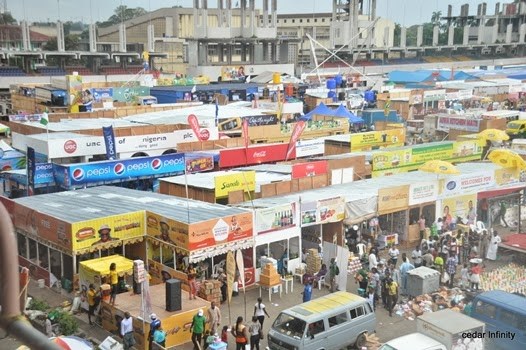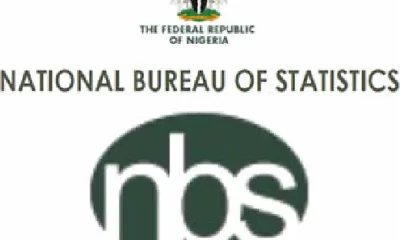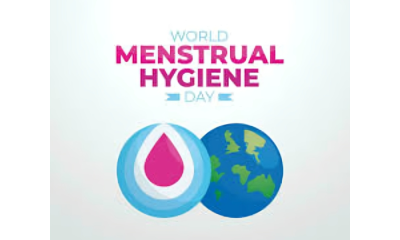BUSINESS
NBS, Foundation Partner to Enhance Nigerian Public Sector Performance

By Tony Obiechina, Abuja
The National Bureau of Statistics (NBS) and the Aig-Imoukhuede Foundation have announced a partnership to develop the Aig-Imoukhuede Public Sector Performance Index which seeks to measure the impact of the public sector on the overall productivity and economic growth of the Nigerian economy and on the wellbeing of Nigerian citizens.
A Memorandum of Understanding to that effect was signed on Thursday in Abuja between the NBS and the Foundation for the development of the Aig-Imoukhuede Public Sector Performance Index.
According to a statement jointly issued by NBS Director of Communications, Mr Joel Sunday Ichedi and the Foundation’s Head of Communications, Patience Salami said the Index will measure the impact that public sector activities have on the overall productivity and economic growth of the Nigerian economy and on the wellbeing of its citizens.
The Index is being developed by the Foundation in partnership with the Governance and Institutions Policy Commission (GIPC) of the Nigerian Economic Summit Group (NESG), as part of its work to facilitate the transformation of the Nigerian public sector. Present at the signing ceremony, which held at the Statistics House, Abuja, were the Statistician-General of the Federation, Dr. Simon Harry, the Chairman and Executive Vice Chair of the Foundation, Mr. Aigboje and Mrs Ofovwe Aig-Imoukhuede, as well as senior officials and staff of both organisations.
The signing of the agreement marks the long-term commitment of both organisations to work collaboratively to develop the Index and ensure its success.
Dr Simon Harry, the Statistician-General, National Bureau of Statistics (NBS), in his remarks said, “This Index aligns with the goal of the Bureau to provide credible statistics on the public sector that will promote evidence-based decision making. The National Bureau of Statistics under my leadership commits to lending its full support to this laudable initiative by ensuring that it is designed, developed and delivered to global standards, comparable to any other world class index”.
Continuing, he said, “This Index could not have come at a better time, and I look forward to working with the Aig-Imoukhuede Foundation in its quest to transform the performance of the Nigerian public sector.”
Mrs. Ofovwe Aig-Imoukhuede, Executive Vice-Chair of the Foundation said, “Despite its huge potential, Nigeria performs poorly across all indicators of the Human Development Index. There is a direct correlation between better performing countries and the efficiency of their public sector and so our goal at the Foundation is to foster improvement in the Nigerian public sector in order to achieve better outcomes for Nigerian citizens.
“This Index will comprehensively review and provide feedback on the performance of public institutions with a view to identifying success factors for improved public sector performance and providing the government with an objective view of areas of progress and areas for performance improvement. It will also provide citizens with information about public sector performance in an accessible manner and encourage informed national debate.”
The Chairman of the Foundation, Aigboje Aig-Imoukhuede stated, “I am confident that this partnership between the Foundation and NBS will facilitate the creation of an Index that has legitimacy and wide acceptance to a diverse range of stakeholders nationally and globally. This Index is just one of the numerous initiatives we are currently undertaking at the Foundation, to achieve our vision of closing the gap between Africa and the rest of the world.”
The National Bureau of Statistics is the apex statistical agency statutorily responsible for the coordination of the operations of the National Statistical System in the production of official statistics for all the three tiers of Government including all the Federal Ministries, Departments and Agencies (MDAs), State Statistical Agencies (SSAs) and Local Government Councils (LGCs).
The partnership and collaboration between both organisations will facilitate the exchange of ideas, expertise, and tools in developing the ground-breaking Index, the first of its kind on the African continent.
The Index Project Manager added “What you cannot measure, you cannot improve. This Index is being designed to provide a credible, reliable, and robust tool that can lead to a better performing public sector. We are therefore very excited to witness the signing this Memorandum of Understanding today”.
Agriculture
NNPC Foundation Empowers Vulnerable Farmers in Oyo, Osun

No fewer than 500 farmers on Tuesday benefited from the NNPC Foundation agricultural training initiative for vulnerable farmers in Osun and Oyo States.
The training, marking the flag-off in the South-West zone of Nigeria, was held at the Ilora Baptist Grammar School, Ilora, Oyo State.
The foundation manages the Corporate Social Responsibility (CSR) initiatives of NNPC Limited, focusing on education, health, environment and energy access to communities nationwide.
The Managing Director of the foundation, Mrs Emmanuella Arukwe, said the initiative demonstrated the commitment to food security and economic empowerment for Nigerian farmers.
Arukwe, who was represented by Dr Bala David, the foundation’s Executive Director, Programme Development, said the project aimed to build resilience, boost productivity and promote sustainable agriculture.
“We are training 6,000 farmers across six zones in climate-smart practices, modern techniques, quality inputs, and market access,” she said.
She, therefore, urged farmers to participate actively and embrace the opportunity to help secure Nigeria’s food and economic future.
Mr Olasunkanmi Olaleye, Oyo State Commissioner for Agriculture and Rural Development, commended NNPC Foundation for the training and empowerment programme.
Olaleye, who was represented by Mr Olusegun Ezekiel, the ministry’s Director of Regulation and Enforcement, said empowering vulnerable farmers was crucial in addressing national food security challenges.
He added that the initiative aligned with Oyo State’s agricultural transformation agenda of Gov. Seyi Makinde.
“We remain committed to supporting initiatives that uplift farmers and improve productivity and livelihoods,” Olaleye said.
He encouraged participants to make the most of the training opportunity to improve their practices.
He also called for future collaboration between the foundation and the ministry to achieve greater impact.
The training consultant, Prof. Daniel Ozok, described vulnerable farmers as smallholders with an under-five-hectare farm size, mainly made up of women, youth, and the elderly.
“These farmers are most affected by climate shocks, hence the need for focused training,” Ozok said.
According to him, training equips them with modern techniques and strategies for improved productivity and market access.
Some of the participants expressed gratitude to NNPC Foundation and promised to apply the knowledge gained from the training.
NAN reports that a medical screening exercise was organised by the foundation for participants on the sidelines of the training.
Training initiative would later be held for farmers in Ekiti and Ondo States on a date different from that of Ogun and Lagos States. (NAN)
Economy
Customs Zone D Seizes Contraband Worth N110m

The Nigeria Customs Service (NCS), Federal Operation Unit (FOU), Zone D, has seized smuggled goods worth over N110 million between April 20 till date.
The Comptroller of Customs, Abubakar Umar, said this at a news conference on Tuesday in Bauchi.
He listed the seized items to include 11,200 litres of petrol; 192 bales of second hand clothing, 140 cartons of pasta, 125 pairs of jungle boots, 47 bags of foreign parboiled rice and 9.
40 kilogramme of pangolin scales.Umar said the items were seized through increased patrols, intelligence-led operations, and strengthened inter-agency collaboration.
The comptroller said the pangolin scales would be handed over to the National Environmental Standards and Regulations Enforcement Agency (NESREA) for appropriate action, while the seized petrol would be auctioned, and the proceeds remitted to the federation account.
He attributed the decrease in smuggling activities of wildlife, narcotics, and fuel to the dedication and professionalism displayed by the personnel in line with Sections 226 and 245 of the NCS Act 2023.
The comptroller enjoined traders to remain law abiding, adding the service would scale up sensitisation activities to combat smuggling.
“We remain resolute in securing the borders and contributing to Nigeria’s economic development,” he said.
The FOU Zone D comprises Adamawa; Taraba, Bauchi, Gombe, Borno, Yobe, Plateau, Benue and Nasarawa. (NAN)
Economy
Trade Tensions: Global Economy Stands at Fragile Turning Point -UN

The UN Department of Economic and Social Affairs (UN DESA) has said that the global economy stands at a fragile turning point amid escalating trade tensions and growing policy uncertainties.UN DESA, in a report published on Thursday, stated that tariff-driven price pressures were adding to inflation risks, leaving trade-dependent economies particularly vulnerable.
It stated that higher tariffs and shifting trade policies were threatening to disrupt global supply chains, raise production costs, and delay key investment decisions – all of this weakening the prospects for global growth. The economic slowdown is widespread, affecting both developed and developing economies around the world, according to the report.For instance, in the United States, growth is projected to slow “significantly”, as higher tariffs and policy uncertainty are expected to weigh on private investment and consumer spending.Several major developing economies, including Brazil and Mexico, are also experiencing downward revisions in their growth forecasts.China’s economy is expected to grow by 4.6 per cent this year, down from 5.0 per cent in 2024. This slowdown reflects a weakening in consumer confidence, disruptions in export-driven manufacturing, and ongoing challenges in the Chinese property sector.By early 2025, inflation had exceeded pre-pandemic averages in two-thirds of countries worldwide, with more than 20 developing economies experiencing double-digit inflation rates.This comes despite global headline inflation easing between 2023 and 2024.Food inflation remained especially high in Africa, and in South and Western Asia, averaging above six per cent. This continues to hit low-income households hardest.Rising trade barriers and climate-related shocks are further driving up inflation, highlighting the urgent need for coordinated policies to stabilise prices and protect the most vulnerable populations.“The tariff shock risks hitting vulnerable developing countries hard,” Li Junhua, UN Under-Secretary-General for Economic and Social Affairs, said in a statement.As central banks try to balance the need to control inflation with efforts to support weakening economies, many governments – particularly in developing countries – have limited fiscal space. This makes it more difficult for them to respond effectively to the economic slowdown.For many developing countries, this challenging economic outlook threatens efforts to create jobs, reduce poverty, and tackle inequality, the report underlines. (NAN)




























